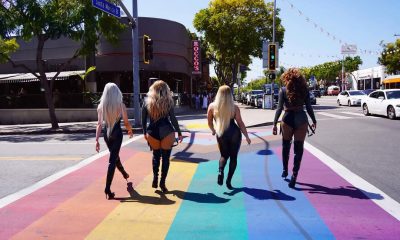Arts & Entertainment
Local actor Mike Bowers returns to Live Spot at Musical Mondays
MuMo continues to celebrate its 16th anniversary by showcasing local talent
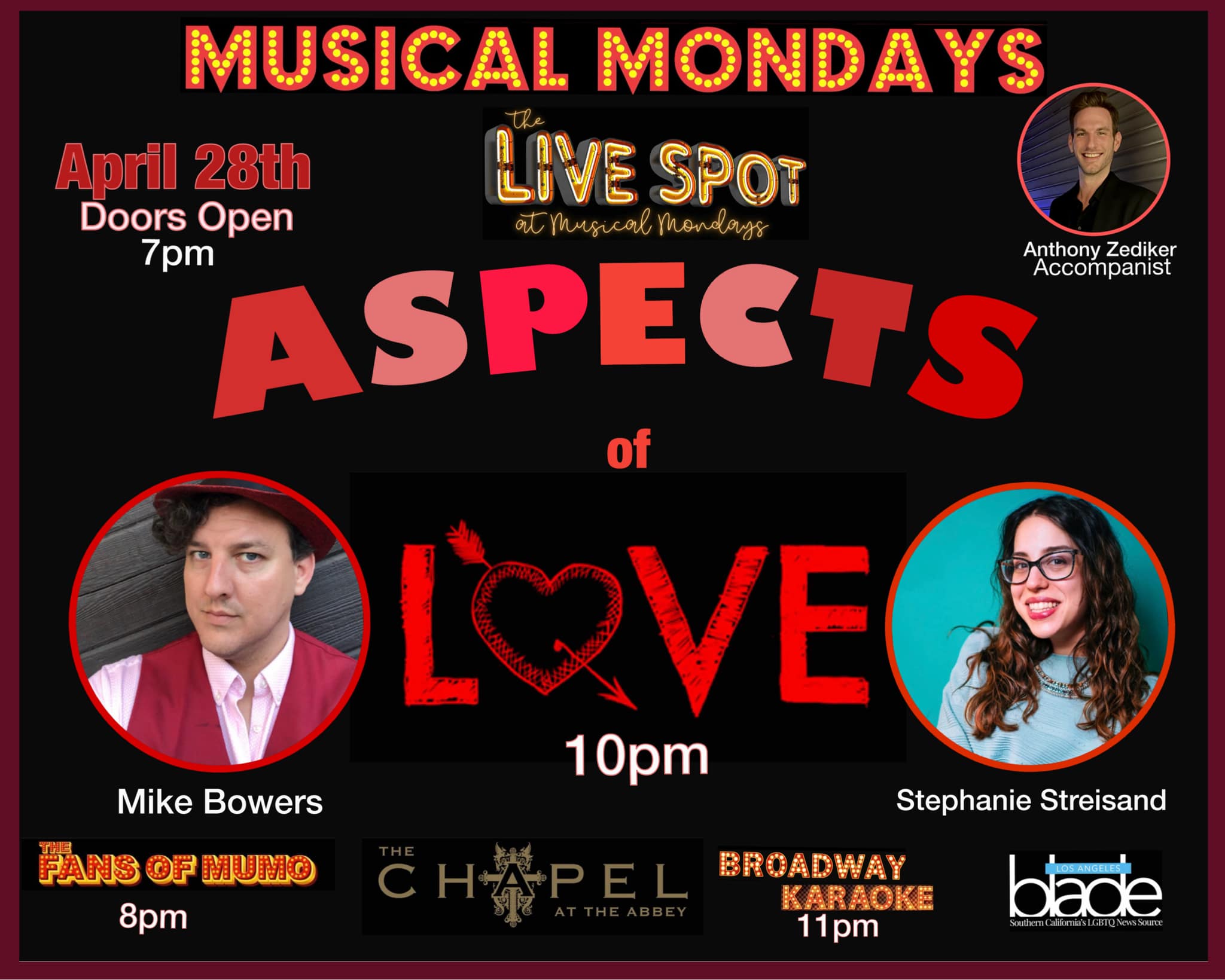
Local actor Mike Bowers is no stranger to Live Spot at Musical Mondays at The Abbey. He has been a part of the MuMo family for quite a while now, returning to the live performance spotlight several times a year. This Monday, Bowers will take the stage again for the themed night, “Aspects of Love.”
Bowers is a true man of the theatre. He has produced a number of musicals, cabarets, and plays in Los Angeles, after moving here over a decade ago. Bowers received his theatre degree from Florida State University and moved to Seattle to pursue a career in stage management. But the stage continued to call and pivoted back to his love of acting and directing.
He came to Los Angeles with no theatre contacts, working at a retail job. Fueled by his passion, he infiltrated the theatre community and hasn’t looked back since. He is the founder of Southern Bard, a theatre company that does readings of Shakespeare with Southern accents at The Roguelike Tavern in Burbank.
We caught up with Bowers as he prepares for his return to MuMo.
What first inspired you to fall in love with the stage?
I’ve enjoyed performing ever since I was little, but it was in high school that I really started singing, and it’s been my favorite thing in the world ever since.
You came to LA without any industry contacts, working retail. How did you become such an integral part of the LA theatre community?
I really owe it to my friends Madelyn Hayman and Becker Grumet, who cast me in my first stage musical in LA in 2016. I found my theatre community with them, and it only grew from there.
What do you bring to the theatre community that is unique?
I feel like I have a really innate sense of what works and what doesn’t, and I’m not overly precious about ideas.
You produce, act, and direct – what aspect do you enjoy doing the most?
Nothing brings me greater joy than singing, but I think if I had to pick a forever career, it would be directing.
What has been a favorite LA theatre project you’ve worked on so far?
I’m really proud of the work I did with Conundrum Theatre Company while I was there, and in 2022 I directed a production of Cabaret that I wish could have run for years.
What was your first exposure to Musical Mondays?
Gosh, it’s been so long! I think it was through my friend Mandie Hittleman, who invited me to one when it was still at Rage (RIP).
What do you love most about performing at the Live Spot at Musical Mondays?
It’s a great, supportive, low-pressure way to explore music and push myself vocally in a welcoming, safe space.
What can we expect from this upcoming Musical Monday Live Spot?
Great vocals!
What do you love most about Musical Monday audiences?
Just how supportive they are of the entire theatre community.
You are also the mastermind behind Southern Bard. Shakespeare with Southern accents? What inspired you to put the company together and was in the connection between the Bard and the South?
There was a trend on social media of people doing Shakespeare monologues in Southern accents and I was surprised at how well the language fit in that dialect. Taking it further, many researchers believe that the Southern accent is closer to what the British accent was in Elizabethan times. We’ve found that the accent can make the language more accessible to audiences, and it’s been fun to explore that with different plays and through a queer lens.
What is your message to MuMo fans?
Thank you for always being there!
Los Angeles theatre audiences will next see Bowers in a unique adaptation of the classic novel, The Time Machine, at this year’s Hollywood Fringe Festival in June.
Books
Chronicling disastrous effects of ‘conversion therapy’
New book uncovers horror, unexpected humor of discredited practice
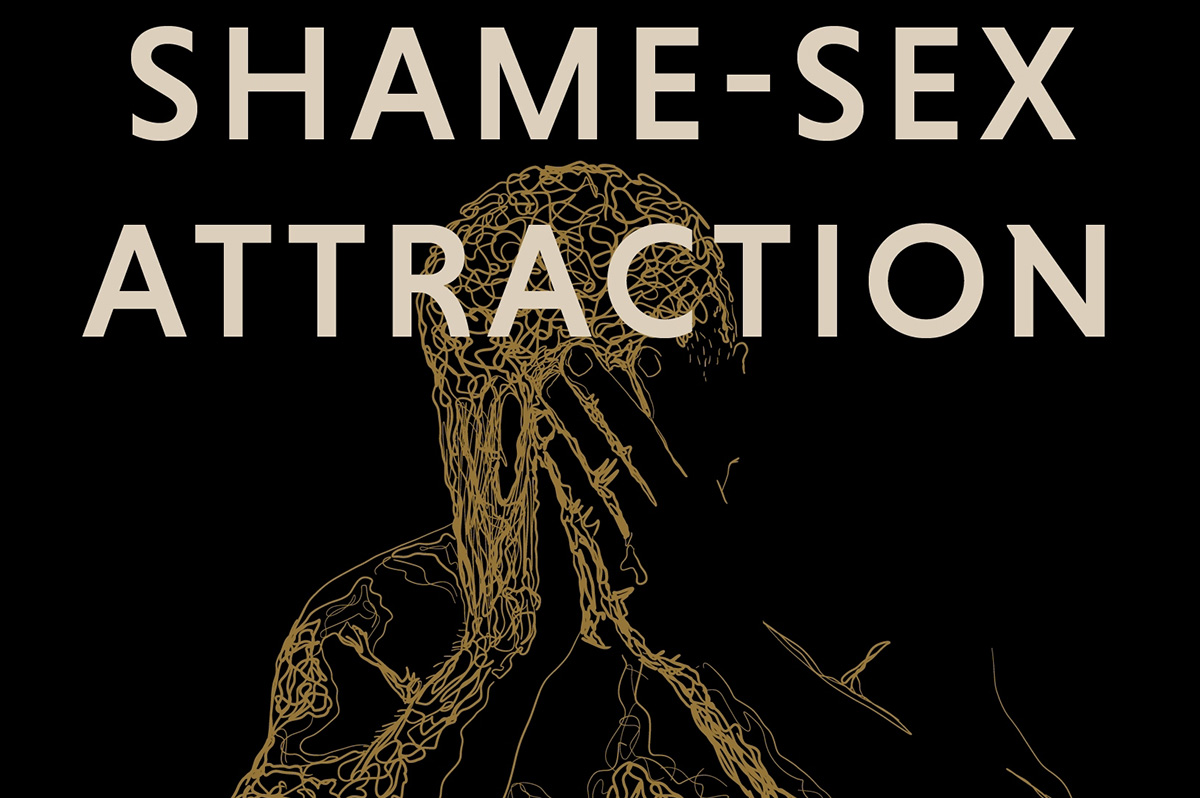
‘Shame-Sex Attraction: Survivors’ Stories of Conversion Therapy’
By Lucas F. W. Wilson
c.2025, Jessica Kingsley Publishers
$21.95/190 pages
You’re a few months in, and it hasn’t gotten any easier.
You made your New Year’s resolutions with forethought, purpose, and determination but after all this time, you still struggle, ugh. You’ve backslid. You’ve cheated because change is hard. It’s sometimes impossible. And in the new book, “Shame-Sex Attraction” by Lucas F. W. Wilson, it can be exceptionally traumatic.

Progress does not come without problems.
While it’s true that the LGBTQ community has been adversely affected by the current administration, there are still things to be happy about when it comes to civil rights and acceptance. Still, says Wilson, one “particularly slow-moving aspect… has been the fight against what is widely known as conversion therapy.”
Such practices, he says, “have numerous damaging, death-dealing, and no doubt disastrous consequences.” The stories he’s collected in this volume reflect that, but they also mirror confidence and strength in the face of detrimental treatment.
Writer Gregory Elsasser-Chavez was told to breathe in something repellent every time he thought about other men. He says, in the end, he decided not to “pray away the gay.” Instead, he quips, he’d “sniff it away.”
D. Apple became her “own conversation therapist” by exhausting herself with service to others as therapy. Peter Nunn’s father took him on a surprise trip, but the surprise was a conversion facility; Nunn’s father said if it didn’t work, he’d “get rid of” his 15-year-old son. Chaim Levin was forced to humiliate himself as part of his therapy.
Lexie Bean struggled to make a therapist understand that they didn’t want to be a man because they were “both.” Jordan Sullivan writes of the years it takes “to re-integrate and become whole” after conversion therapy. Chris Csabs writes that he “tried everything to find the root of my problem” but “nothing so far had worked.”
Says Syre Klenke of a group conversion session, “My heart shattered over and over as people tried to console and encourage each other…. I wonder if each of them is okay and still with us today.”
Here’s a bit of advice for reading “Shame-Sex Attraction”: dip into the first chapter, maybe the second, then go back and read the foreword and introduction, and resume.
The reason: author Lucas F. W. Wilson’s intro is deep and steep, full of footnotes and statistics, and if you’re not prepared or you didn’t come for the education, it might scare you away. No, the subtitle of this book is likely why you’d pick the book up so because that’s what you really wanted, indulge before backtracking.
You won’t be sorry; the first stories are bracing and they’ll steel you for the rest, for the emotion and the tears, the horror and the unexpected humor.
Be aware that there are triggers all over this book, especially if you’ve been subjected to anything like conversion therapy yourself. Remember, though, that the survivors are just that: survivors, and their strength is what makes this book worthwhile. Even so, though “Shame-Sex Attraction” is an essential read, that doesn’t make it any easier.
The Blade may receive commissions from qualifying purchases made via this post.
Events
New ‘Party with a Purpose’ lesbian brunch to be hosted at Sorry Not Sorry
Lez Brunch is coming to Sorry Not Sorry L.A. on May 17 with bottomless mimosas and games

Jessica Wagstaff is the founder of Homology L.A. and most recently partnered up with The Queer 26, a nonprofit platform for QTBIPOC creatives, to produce Lez Brunch. The brunch will be hosted on May 17, from noon to 4p.m., at Sorry Not Sorry. The 4,000 sq-ft event space is a well-respected wine-forward, cocktail bar in Los Angeles that also hosts lots of other LGBTQ events, drag shows and more, throughout the year.
Wagstaff believes it is important to not only host this event, but also to make it as safe and inclusive as possible. They have also incorporated a community outreach aspect to this event by giving back to their community by donating proceeds to non-profit and mutual aid organizations.
Everything down to the ticketing site, is queer and inclusive.
“The ticketing website allows attendees to enter in their name which may differ from their legal name, which I think is a really important aspect right off the top of the bat, they know we care about who they are right at the start of their experience with us,” said Wagstaff. “In fact the ticketing website is the only platform that is queer owned and operated in the world, it’s called Sickening Events. So we know that it’s also benefiting our community.”
The performers are also part of the LGBTQ+ community and Wagstaff believes that by having a line-up of performers and entertainers who mirror and represent the community, it allows people to feel safe, heard and seen.
“I’ve always been very passionate about having a lineup that directly mirrors our community from BIPOC, trans, queer, non-binary, etc,” said Wagstaff.
Wagstaff is also a licensed security guard who says safety and security is on the top of their priorities when it comes to hosting these events.
“I will have a code of conduct signage and training at the front door which will be promoted by wait staff, restaurant management, plus all Lez Brunch talent and staff,” said Wagstaff.
The event will be hosted by Ruthie Alcaide who is a TV personality who has been a contestant on The Real World: Hawaii, a finalist on Battle of the Sexes and All Stars 1, and she also competed on Battle of the Sexes 2, The Gauntlet 2, and The Duel II.
Wagstaff is also working in collaboration with Camille Ora-Nicole, founder of The Queer 26 and multi-hyphenated creative.
Ora-Nicole has been hosting events and collaborating with queer and trans BIPOC creatives across Los Angeles to bring more visibility to those marginalized communities. Her and Wagstaff agree that queer joy is the biggest form of resistance and that hosting these events during this politically polarizing time is much needed for survival and for the people in these communities to have the space to heal, gather, celebrate and network.
To learn more about The Queer 26, visit their website.
Events
Los Angeles Blade’s Community Series kicks off with panel
First panel in series brought in community leaders, politicians and other notable figures

The Los Angeles Blade kicked off its “Free Community Series” in partnership with Roar
Resistance, for a rousing discussion panel titled “Time To Get Informed, Time To
Resist” at The Abbey in West Hollywood last Saturday.
The event featured a panel of notable figures in the city’s government and queer
activism circles who spoke about how to organize and protect queer rights in the current
political climate.
The panel was moderated by Roar Resistance’s Michael Ferrera, and included West
Hollywood Mayor Chelsea Byers, former WeHo Mayor and queer activist Abbe Land,
Equality California Communications Director Jorge Reyes Salinas, Political Vice
President of the Stonewall Democratic Club, Nico Brancolini and NAACP LGBTQ
Committee Chair Chris Baldwin.
The discussion kicked off with a call by Abbe Land for participants to stay focused on
the issues that matter, despite the flood of new developments constantly coming from
the White House.
“I do think it was designed that way to keep us crazed, to keep us unfocused, to keep us
in a state of panic and fear,” said Land. “We have to look at what is happening and
where is our lane and where are we going to focus our energies and have trust that
there are other people that are focusing in other areas that need focus.”
Each of the panelists then described how the first few months of the current
administration has impacted the work they’re doing in the community and the dangers
they see on the horizon.
“I have been deeply disturbed by the elite capitulation that occurred this time around,”
Brancolini said, noting the big law firms and media corporations that have acceded to
“unconstitutional orders” and rushed to make settlements with Trump and his family.
“Frankly, I’ve been disappointed by a lot of the national Democratic leadership. I think
they treated a 1.5% plurality victory on Trump’s behalf as if it was a huge blowout, and I
think that’s a big mistake,” said Land.
Reyes Salinas pointed out that a one of the most vulnerable communities right now is
trans youth.
“The target is on their backs and the backs of their families and providers,” he said.
“Here in California, we have laws that protect them and we keep improving those, but
there’s still so much fear, and it’s important for everyone to be able understand that
these are children’s lives at stake here.”
But while there was agreement that there is much at risk at the current moment, Chris
Baldwin said this was a time to build stronger coalitions.
“I don’t live my life in fear. I am a Black woman born in the 60s, at a time when my father
when we traveled to Alabama had to step across the street to let a white man pass,”
she said. “We will get through this. Black people have lived through much worse.
Welcome to the civil rights movement. We are going to experience setbacks but we will
keep pushing forward.”
Later, Baldwin invited attendees to join the NAACP, noting that it is an interracial
organization whose membership is open to all. Chelsea Byers echoed that sentiment, noting that this moment presents an opportunity for a new generation of leaders to imagine new ways to solve society’s big problems.
“We know that people are under-resourced. We need to make education accessible to
people bring them on board, help them understand these processes and meet them
where they’re at,” she said. “We need to bring people on board. We can’t go back to
what was, because it wasn’t working. We need to activate our political imaginations in
the biggest way possible.”
When the discussion turned to what people can do to protect our rights, the panelists
focused on practical things anyone can do to help build a successful coalition for
change.
“Every day, do something. It doesn’t have to be a big thing. It might be just calling
someone to check in on them, it might be writing a letter, or calling your congressman. It
might be a passive thing,” said Land. “That moment when you think, ‘Oh my god, I can’t believe this,’ that’s when you do something, anything and it’ll propel you for the next
day.”
The panel also addressed concerns from the audience that we have to ensure that our
activism is inclusive and intersectional.
“Feminism without intersectionality is just white supremacy,” Baldwin said. “Going
forward with your coalitions, I encourage you to be intentional with your intersectionality,
not just tokenism.”
“There are some common needs that we all care about and it doesn’t matter who you
are, and that’s where we have to be. But when we’re fighting for those things, we have
to recognize there are some people who have different ideas of what that looks like, and
we have to be open to that,” said Land. Reyes Salinas added that it’s an important priority for Equality California to use its platform to lift the voices of diverse parts of the community.
“We can elevate your coalitions, your storytelling, whatever’s happening, my team can
make sure that that’s elevated to ensure that other people see you as a trusted source,”
he said.
Reyes Salinas added that Equality California offers leadership training programs for
people who want to get experience in politics and running for office.
The Los Angeles Blade is planning more community forums to discuss hot-button
issues as they arise.
Arts & Entertainment
Infectious ‘Egghead & Twinkie’ celebrates love and allyship
Lesbian teen takes journey to self-acceptance with straight BFF

If you’ve ever wondered why so many queer movies are are coming-of-age stories, it might be that you were lucky enough to go through the transition into young adulthood without having to worry about your sexual alignment or gender identity being acceptable to your family or your friends or the world at large – and if that’s the case, we are truly happy for you. That’s the way it should be for everyone.
Unfortunately, it’s not.
For many millions of queer kids, growing up is still an experience fraught with fear, shame, and very real peril, and this was true even before the current era of government-sanctioned homophobia and bigotry. It’s never been easy to become who you are when you’re surrounded by a family or community that refuses to accept who you are. It’s as near a “universal” queer experience as one can imagine in a demographic as diverse as ours, and it reinvents itself with each new generation — so there will always be an appeal for queer audiences in stories which express that often painful odyssey in a way that makes us feel “seen.”
That’s why “Egghead & Twinkie” — a 2023 film fest fave only now getting a VOD release (on April 29) — is such a welcome and refreshing addition to the genre. A passion project from Asian American filmmaker Sarah Kambe Holland, who expanded it into a feature from a “proof-of-concept” short she made in 2019, it brings a Gen Z perspective, which makes it as unique and contemporary as it is recognizable and relatable.
Set in suburban Florida, Holland’s movie centers on the relationship of its two title characters. “Egghead” (Louis Tomeo) and “Twinkie” (Sabrina Jie-A-Fa), childhood friends with a deep bond from growing up across the street from each other, face a crossroads as the cute-but-nerdy Egghead prepares to depart for college, leaving behind Twinkie — an Asian-American adoptee raised by socially conservative white parents who is one year his junior just as she is beginning to come to terms with her long-hidden lesbian identity.
Planning to connect with her social media crush (Ayden Lee) at a nightclub event in Texas, she enlists Egghead to accompany her as she “runs away” from her restrictive parents into the arms of a girlfriend she has never actually met in person, at a bar she’s too young to get into. Needless to say, it’s not a great plan — especially since the straight Egghead has long-hidden feelings of his own for his B.F.F — but it leads to a shared adventure in which they each must redefine both their feelings and their commitment toward each other, while staying one step ahead of her frantic family and dealing with the mishaps inherent in taking an impromptu cross-country road trip in a car you stole from your father.
There’s a youthful verve to the whole affair, punctuated with the inevitable irony that comes from watching it unfold through the eyes of age and experience. Something that younger viewers may appreciate less than its spirit of boldness and (admittedly comedic) rebellion — and embellished with a visual aesthetic that reflects both Holland’s background as a YouTube “content creator” and the lead characters’ shared love of comics and anime.
But what gives the film that extra “oomph” and makes it feel more significant than many of the other youth-oriented queer entertainments of recent years is not so much about the style of its storytelling as it is the nature of the relationship at its core.
Though “Egghead & Twinkie” is unequivocally a queer coming-of-age movie — which certainly deals with its teen lesbian protagonist’s journey to self-acceptance and includes an unexpected but irresistible connection with a fellow queer, Asian American teen (Asahi Hirano) she meets along the way, unapologetically endorsing the validity of its heroine’s romantic pursuit, however misguided it may seem — it is ultimately a film less about queer identity than it is about friendship.
While it allows ample opportunity for Twinkie to refine her values and learn from the mistakes of her rebellious quest for self-acceptance, it never loses sight of the fact that her long-term relationship with Egghead is one of mutual support and unconditional love. More than a romance, this YA-ish story of love beyond sexuality is a tale of true ally-ship, in which the unconditional understanding between friends — between fellow living beings — becomes more important than the romantic fantasies of a more naive conception of queer existence.
It’s a love story, to be sure, but the love it lifts up is the kind ultimately has little to do with questions of sexual identity. Instead, it’s the kind that transcends biology and sexuality to express something arguably more essential — the genuine emotional bond between two kindred souls that has nothing to do with either, but rather draws its power from shared experience and mutual acceptance. It’s that rarest of movies that celebrates the value and importance of platonic love that stretches across personal boundaries or divides, and ultimately reinforces the connections of shared humanity as being at least as much important as those created by our sexual makeup.
It’s a love story between friends, not a romance between strangers, and the fact that its platonic protagonists are able to find the value of their connection beyond juvenile assumptions and impulses makes it arguably a more mature and insightful experience than even the most idealistically rendered young-love fantasy could ever hope to be.
Of course, its success in achieving that goal hinges on the chemistry between its two young stars, and both Jie-A-Fa and Tomeo capture that alchemical magic with natural ease; both performers originated their roles in the short that inspired the feature, and the familiarity of their chemistry goes a long way toward making it work. Additionally, the performances of both Hirano and Lee — indeed, even of Kelley Mauro and J. Scott Browning as Twinkie’s clueless but ultimately loving adoptive parents — avoid the kind of judgement and clichéd convention that might otherwise make them predictable stock caricatures.
In the end, though, it’s the hopeful, humanistic vision of Holland — who also wrote the screenplay — that informs “Egghead & Twinkie” and helps it resonate beyond the typical. In crafting a queer coming-of-age story that has less to do with sexual wiring than the need for the grounding, life-affirming reinforcement that comes from unconditional love, she has managed to craft a vibrant, hopeful and heartfelt testament to the power of real humanity to overcome and transcend the prejudices and boundaries imposed by a social order that hinges on conformity over individual fulfillment.
That’s not just a queer issue, it’s a human issue — which is why this sweet, charming, and genuinely funny teen “non-rom com” captures us so willingly and so completely.
Events
Celebrate Lesbian Visibility Week with The Curve Foundation
This week’s events are hosted in collaboration with The Curve Foundation

Lesbian Visibility Week, which is running now to April 27, is a nationally recognized celebration created by The Curve Foundation to honor lesbians and sapphics and their accomplishments.
The events this week will be hosted by Cinnamon Rivera, a well-known and active voice in the queer, Latinx,community, and Alex Banx, a well-known community voice in the queer, Black community.
“I’m personally excited about our BIPOC Lesbian Speed Mingling event happening on Lesbian Visibility Week Friday,” said Banx. “The event sold out with more than a week to go, [so] the need was clearly there. A lot of people can be socially timid, so this is why we wanted to make it easy — take the pressure out. This isn’t just about dating, this is about creating sustainable, long-lasting connections; whether they be friends, lovers, business partners, or whatever else happens.”
On Thursday, LVW will celebrate with a Drag King takeover at Micky’s in West Hollywood. The event will be a collaboration between The Curve Foundation and Them Fatale, a drag king collective that is inclusive of performers who do not identify as cis men outside of drag.
The event will feature drag by Manny Oakley, Malcolm Xtasy, Jack Doff, Precious Julz, Anna Shevitz and will be hosted by Provvidenza.
On Friday, Lesbian Visibility Week will make its way through Long Beach. Adelita’s Revenge, a Latinx, queer-owned business, inside Viento y Agua, a Latinx and queer-owned coffee shop. They will be hosting the Lynx for Lez Speed Mingle night.
On Saturday, LVW will host two events across L.A. and Long Beach.
One will happen at KISO, DTLA’s newest queer bar. The event hosted by Cinnamon Rivera will feature a line-up of poets, DJ’s, vendors and art on display.
The event, which will happen from 4p.m. to 9p.m., will also feature live performances by Irene Díaz, a Chicana singer-songwriter from East Los Angeles who gained popularity for her timeless love songs. Nico Turner, a multi-instrumentalist and musician from Los Angeles, who’s known for hosting the infamous Gay Asstrology parties.
The exciting line-up of poets will feature Karla Lamb who’s known as VinylOwl on Instagram, host Cinnamon Rivera and Verónica Reyes, who’s known as EastLosAngelesPoet on IG.
That same day, LVW will also host the Queer Women in Sports Day panel at Watch Me Sports Bar at 3p.m.
The event is set to feature an exciting line-up of panelists such as Rachel Pearson, lead video editor and ESPN EQUAL Advisor for ESPN; Carmen Bona, president of business operations at Angel City Football Club; Evan Unrau, director of social and community impact at LA84; Julie Shaw, Ph.D., leadership and DEI consultant; and Jax D., owner of Watch Me! Sports Bar.
To learn more about this week’s events and find local, as well as national events, visit the website.
Bars & Parties
Bear World Magazine gives the bear community a mighty roar
Richard Jones is fighting the good fight in queer subculture representation
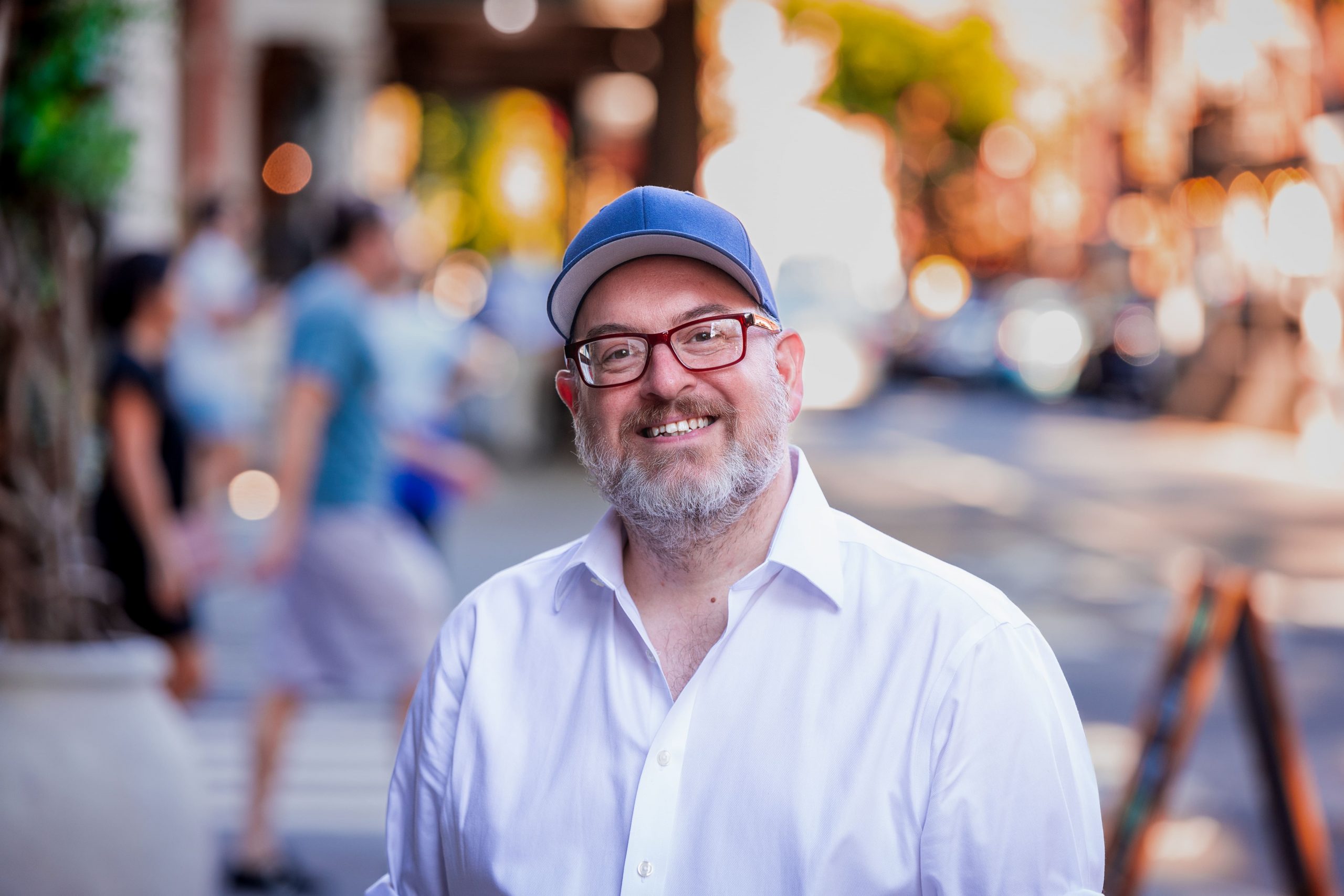
Entrepreneur and co-founder of Gray Jones Media, Richard Jones is the mastermind behind Bear World Magazine. Together with his editor, Robin Gray, they understand that their publication is needed now more than ever.
In 1979, George Mazzei wrote an article for The Advocate characterizing gay men by certain animals titled, “Who’s Who in the Zoo?” It was that article that gave voice to the chubbier, hairier, gay man — the almighty ‘bear.’
The term took wing and by the mid-1980s, gay men, who identified as ‘bears’ would gather in social and sexual settings. Feeling ousted because of body type and hairy body parts, these bear groups would congregate separate from the gay community at large, feeling safe and accepted in their own circle.
Presently, the bear community is a thriving, worldwide community with a variety of events and social groups, and the members of that sector have grown to include all shapes and sizes. Over the last decade, the bear community has gained a bigger presence in mainstream gay culture and one can spot a number of twinks at bear pool parties as well as a large contingent of bears showing off on Pride main stages. As the celebration of body types gains traction and the pressures of peak physique diminish, the segregation of the bear community and the rest of gay culture has faded.
Keeping the bear voice very much alive is Bear World Magazine, which is ready to celebrate 13 years in media. Celebrating the bear culture and all of its varying members, is at the forefront of Bear World, without diminishing the queer community that exists beyond the ‘zoo.’
Despite the challenges that chubbier men face because of societal norms and despite the challenges that queer media has faced in recent political climates — they continue to fight the fight via their online publication, podcasts, awards, nationwide events and video content.
The bear’s roar continues to represent.
We chatted with Jones as we compared notes on queer media, building a legacy and what the future of queer representation might look like.
What was the inspiration for starting Bear World?
It was all an accident. I was a member of a bear online group that is no longer around and for the life of me cannot remember the name. They asked the 30,000 members for help with ideas to save the site. Server costs were crippling, etc. I pitched them an idea to create their own magazine. I would own it but license their name and split the ad money with them. They liked the idea and asked me to pitch it more formally. I started to prepare that and then never heard from them again. I think our idea was great but wasn’t going to make enough money for them quick enough. In the end, I realized I could do it anyway and changed the name to Bear World Mag and here we are almost 13 years later.

Bear World Mag’s first cover, featuring the cast of “Where The Bears Are,” in August 2012. Photo courtesy of BWM.
What was your first exposure to the bear world as a queer man?
Funnily enough, it was a visit to Ty’s in NYC — before I really knew what Bears were. I remember seeing ‘BEAR’ as a specific chat room in Gaydar (that’s an old reference) too — but had no idea. It wasn’t until I started going to Be Your Be Yourself (BUBU), which was started by the amazing Paul Bloomer in Belfast Northern Ireland over ten years ago now, and then a bear group there that I really understood how broad the community could be and how I could fit into it.
What are some of the biggest challenges in keeping BWM thriving?
I think trying to keep it fresh, keeping it looking forward as well. The community is ever-evolving and we try to showcase that. We miss things as we are a small team, so we are always encouraging people to tell us about their events, their groups and we try to showcase as much of the global bear community as we can. We have just started to cover the Australian bear community more deeply, with a new dedicated deputy editor Luka Musicki, who is on the ground talking to the groups and helping us find local advertisers!
What are some of the biggest challenges that queer media faces in general?
I hate talking about this but at the moment it’s the hesitation of advertisers to spend with us. The recent political upheaval has meant that the big advertisers are pulling away and the small advertisers might be more hesitant to advertise because of fear of the economy. We have seen media decline since the pandemic and those of us left are finding it harder to survive.
The appetite to pay for media just isn’t there. It means we have to be leaner and adaptable. It’s why we are starting our Bear World TV content, short videos from key bear voices, showcasing different elements of the bear community. All of us are used to consuming more short-form videos, the bears too. We are very excited about its impact and how it will help stabilize Bear World Mag.
What do you hear most from your readers?
They love the hairy content! I’m serious. I think the way we present a bigger different body —although never nude — is inspiring to them. Our bears of the week who are our readers basically from all over the world, are a key part of showing the community from 21-99 in all body shapes and sizes, we are so very diverse even in this niche community.
What are some of your biggest achievements with the magazine?
Well being here almost 13 years later is the biggest achievement. It was a quick idea that has lasted through greater content, great editors and writers and just never trying to tell the community what they should be but more mirroring them, where they are at all times. I’m proud of some key interviews including Armistead Maupin.
It was a big thrill to meet him and chat with him. He gives good hugs. I’m proud of our female and trans bears that have been cover stars, I’m proud of the young bears that have found us and have said how we helped them be confident in themselves. They always came at my most difficult times and helped me to keep moving forward.
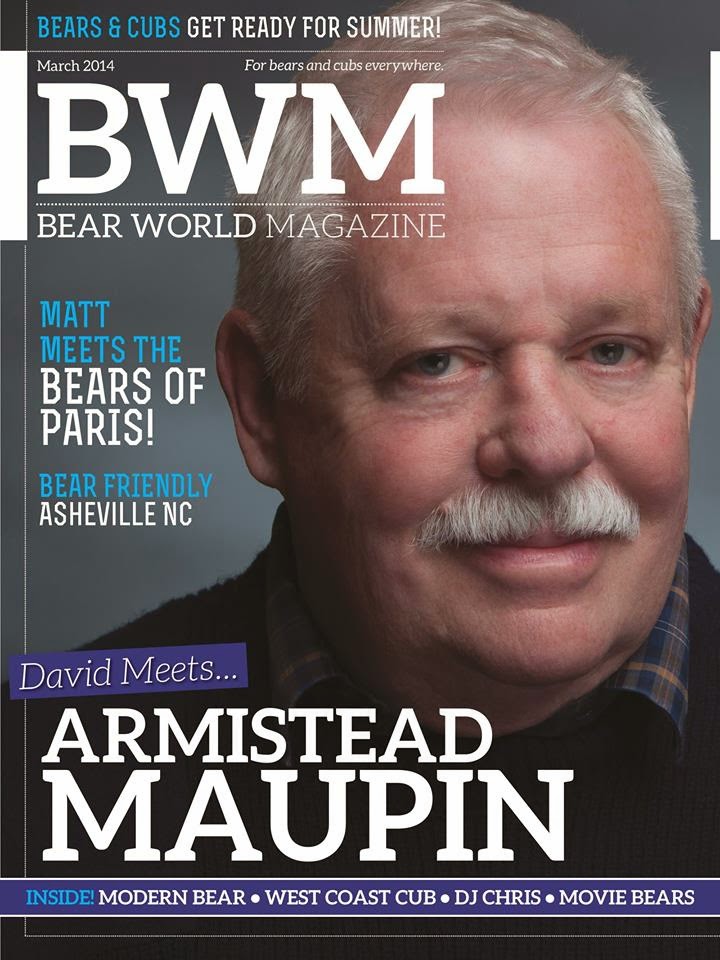
Cover of Bear World Mag featuring Armistead Maupin in 2014. Photo courtesy of BWM.
The bear community has been getting a much bigger voice and more representation in the queer world, why is that?
I think the biggest reason is that the queer community as a whole is getting more representation on mainstream TV, and the mainstream media. The dad bod and body positivity have helped our bodies be seen as attractive. It’s been great to see bears become character choices over the years across many different TV and films. I had the opportunity to interview the very bear-y straight actor Patrick Cox, who played John on “Two Broke Girls.”
I think [he is] a very ordinary representation of a bear and he was not there to be the butt of fat jokes. The “Will & Grace” reboot had Jack partnered with a bear cub. We have seen bears referenced on “30 Rock,” and even the reboot of the “Muppets” had Fozzy Bear talk about gay bears briefly. Just recently on “The Connors” the greatest Bear Icon of all time, Dan, (some would say) referenced the bear community which in a weird way was beautiful to see.
So it all comes back to representation matters. Writers and show-runners are plugged into the community and are now likely to be queer themselves. A key writer on “Saturday Night Live” is queer, so we’ve seen a lot more queer references on that show in recent times. We, of course, are thrilled to see it.
You also do events around the nation. What do you love most about the fellowship of the bear community at these events?
We do a couple of events, Key West Bear Weekend and now WOOF week also in Key West, in partnership with Island House Resort. [That’s our] cheeky plug, thanks!
I think the fellowship is the strength and growth of Bear Weeks and Bear Weekends around the country and the world. To be together and feel safe and attractive is what the queer community finds in any gay or queer bar — and us bears probably never had that. We were always the fat one or the hairy one. To head to a bear weekend and know that you will feel safe just for wearing a tank that shows off your furry shoulders is a tonic to us all.
Add in that we might actually feel attractive and flirted with, and you can see why bears flock to these events. So the fellowship follows, lifelong friends are made and it’s why these events are now starting to hit 20 or 30-year anniversaries. It’s like coming home. Walking down the street in P-town during Bear Week holding your husband’s hand without a worry is magical.
How has the bear community changed the most over the years?
I like to think it’s queerer. Bears can be masculine still, but also a little queer, maybe embrace not feeling that we have to wear plaid, but maybe a crop top and wear pink. And of course that we are more and more making space for our female sisters and trans brothers has been wonderful to see.
How can the general queer community best support the bear community?
That’s a great question. I think as long as we have space to be recognized, in any way at all and never marginalized — that’s all we ask. I think the bear community in turn should show up to support the fuller queer community too. Which I think we are. We always have more work to do, but I think the recent uproar about a bear campsite not welcoming trans bears and then the wider bear community rejecting that and then boycotting that camp, showed who we are at heart. It makes me very proud.
There is much division in the nation right now, also within the queer community. Why is it so important to celebrate the “bear” label and all that subcategories it comes with?
I think this is a time the queer community is able to and should come together, we realize collectively what we have been fighting for these last 50 or more years since Stonewall. We are used to being bullied, so I think on the whole we have thick skin. In celebrating the ‘bear’ label, I like to think we are encouraging of any group to celebrate who they are. Many more subgroups under the queer umbrella are much more visible now, look at how the rainbow flag has evolved, we will continue to as well. Our collective strength is not diminished if we are different from each other in some way, basically, that’s the human race. We need to fully embrace it and make room for all.
What have you learned most about yourself from being the Publisher of Bear World?
Oh gosh, that you can’t stand still. That media is ever evolving as much as we are as people. You have to be resilient and prepared to change because the world both in humanity and in commerce, will change and evolve and you cannot stand still or it will pass you by.
What can we look forward to this year from Bear World?
Well, we are about to start planning for the Bear World Magazine Awards Year three which will be in N.Y.C and part of the Urban Bear Weekend, and the red carpet celebration will be at ReBar. We are really excited about our new video content — which we think will be transformative for us and for the community. More Great covers, so much more content about the Australian bear community too — that’s truly exciting to dive into.
What is your message to the queer community?
Stay strong, find and support the community you are in or want to be part of and live with as much joy as you can because that pisses the haters off way more than our anger. But keep the anger too. We need that as well to fuel our never-ending fight.
Follow everything at Bear World Magazine.
a&e features
Anthony Nunziata Performs the Great Palm Springs Songbook
He brings his signature genre-blending sound to the West Coast

‘America’s next romantic singing sensation,’
As the desert sun dips below the horizon this weekend, the Purple Room in Palm Springs will fill with crooning tales of love, loss and longing. Fresh from a sold-out run at Café Carlyle in New York, Anthony Nunziata brings his signature genre-blending sound to the West Coast. Nunziata invites audiences on an intimate journey through heartfelt originals and inventive takes on timeless classics, joined by cabaret favorite Joan Ryan and acclaimed pianist Jeff Franzel.
“Romance is so nuanced and I believe it begins with being vulnerable and honest,” said Nunziata when asked what it means to be the next romantic singing sensation. “I try to live in my music and song as if the story is being played out for the first time.”
That emotional immediacy is central to his performance style — an approach that resonates deeply with audiences, especially within the LGBTQ community. Nunziata acknowledges that LGBTQ listeners often have a profound connection to themes of love, longing and resilience.
“My original songs dive deep into all of those themes — yearning, a sense of belonging, hope, strength, faith,” said Nunziata.
But it is not just the music that resonates. LGBTQ audiences connect with Nunziata on a personal level as well.
“I’m a proud member of the LGBTQ community,” said Nunziata. “In the time we have in this world, I strive to encourage people that they are worth it.”
“At my concerts, you are loved and you are celebrated for all the beauty that makes you, you.”
While Nunziata’s original musical and personal presence embrace LGTBQ+ life, many songs from the Great American Songbook – with some of these songs appearing in his repertoire – were originally written through a heteronormative lens. However, Nunziata is purposeful in his selection of songs. “I deliberately choose songs that can apply to anyone,” he states, emphasizing that “a good love story is a good love story.” With that inclusive mindset, he also reimagines these pieces through genre-bending interpretations.
“I love bending from R&B to folk to country and classic pop. All the ‘genre-bending’ will be on display in Palm Springs,” Nunziata explains.
Joining Nunziata on stage in Palm Springs is special guest and cabaret favorite Joan Ryan, the acclaimed American actress and singer known for her roles in the Los Angeles production of “Ruthless!” and as Miss Tina Paladrino on “Good Morning, Miss Bliss” — the show that would eventually become “Saved by the Bell.” Nunziata calls Ryan one of his dearest friends.
“She is so quick and witty,” he tells the Blade. “I am excited that she’s free amidst her busy schedule to come to Palm Springs and wow the audiences with her gift.”
In addition to Ryan’s guest appearance, jazz pianist Jeff Franzel serves as Nunziata’s musical director. “I’ve written over 50 songs with Jeff,” Nunziata shares, highlighting Franzel’s impressive songwriting credits with artists like Josh Groban, Placido Domingo and Taylor Dayne. Franzel also brings a bit of local history to the performance — he once played in Palm Springs alongside one of Nunziata’s musical idols, Frank Sinatra.
“It’s a great story, and he’ll tell it this coming weekend,” Nunziata adds.
As with many artists, collaboration plays a key role in Nunziata’s creative process. “The collaborators I work with all bring something unique and wonderful to the songs I’m a part of writing,” he shares. For Nunziata, collaboration isn’t just about combining talents — it’s about openness and vulnerability, creating space for honest expression and new ideas.
“Writing songs is so vulnerable and it feels like the greatest extension of therapy,” he describes.
Looking ahead, Nunziata dreams of sharing the stage with some of his musical heroes. “I can’t wait to do a duet with Adele one day. Andrea Bocelli, too,” he says. At the same time, he honors the legends who paved the way.
“I would have loved to have duet-ed with Sammy Davis Jr. or Frank Sinatra. I do a subtle tribute to Sammy in my concert that I’ll be bringing to Palm Springs.”
Nunziata will take the stage at the Purple Room in Palm Springs on April 18th and 19th. With his eclectic charm and heartfelt approach to songwriting, it promises to be an unforgettable performance — one you won’t want to miss.
Nunziata leaves readers with this:
“It’s beautiful to – as Sondheim so brilliantly wrote – make a hat where there never was a hat. To make something out of nothing. And, if you’re lucky, get to perform the song and touch some lives along the way. That is the driving purpose and passion for my songwriting.”
Bars & Parties
Rocco’s 2.0 is looking to the past to celebrate the future
Matthew Ross’s journey from bartender to new owner of Rocco’s puts him in a unique position to breathe new life into this WeHo hotspot
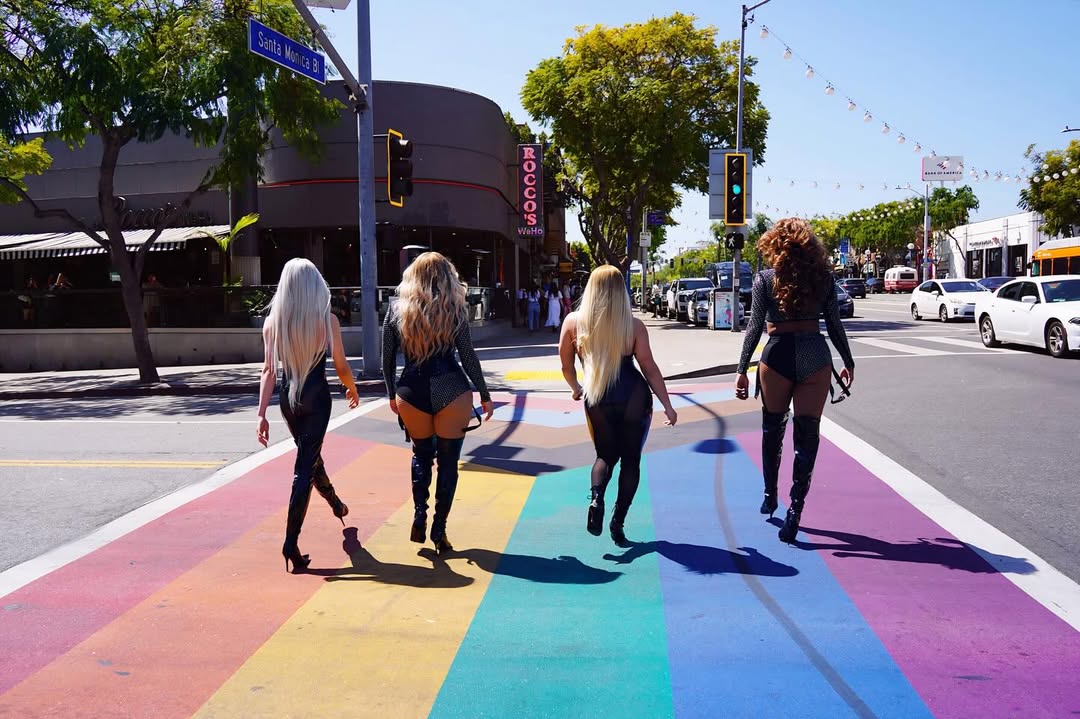
COVID-19 hit the queer bar and club life hard and since then, has struggled to regain its footing. There have been location makeovers, new Happy Hour menus and a bevy of new owners sprouting up on the scene to entice new and returning customers.
Rocco’s, one of West Hollywood’s most visible casual eateries and nightclubs is one the latest venues to gain new ownership. Previously owned by an investment group that included Lance Bass, Rocco’s now claims hospitality aficionado Matthew Ross as its new mastermind.
Who better to take over the vibrant spot than Ross? Ross has over 30 years of food and hospitality experience since working at Sizzler when he was just 16. From there, he has worked his way up from bartender, to Director of Food, Beverage and Nightlife, to now being the owner of Rocco’s.
Ross is a California native who grew up in Agoura Hills. His first foray into West Hollywood’s nightlife came by chance when a friend invited him to “18+ Night” at Micky’s.
“We didn’t know anything about gay bars. We had no idea what to do. We had no idea there were these many gay people in the world, we were shellshocked. That’s kind of where it started.”
Ross ended up going to the Fashion Institute of Design and Merchandising in Downtown, Los Angeles, to study interior design. While he was in school, he worked at some of the bars in West Hollywood and at Micky’s sister bar, Apache, in Studio City. He also got his real estate license, which he still has today, while keeping up his bar jobs. As life would have it, his hospitality career would take over and he found himself in hotels as Director of Food and Beverage. He would also return to Micky’s as a consultant, building the foundation that would make him a miracle worker for locations in need.
“I was a store fixer in a corporate world. I was someone who went to restaurants and bars and had to get them moving back to where the company wanted. So, I’m kind of a pro at going in and fixing things and making them better,” he said.
When the Rocco’s opportunity came about, Ross snatched it up. As someone who understands West Hollywood from an earlier generation, and with his finger on the pulse of what club go-ers want today, he is in a prime place to make some moves in the community.
“I really think it’s time to get back to original, fun West Hollywood because that’s been missing for many years, as far as I’m concerned. I love how free everybody is. We’re all very hard on ourselves and we’re hard on each other. But when we’re in WeHo, we’re in a safe space. That’s what we need in these trying, political times. We need a place where we are safe, and I’m going to make sure that everybody is safe and we’re going to be aligned.”
For Ross, taking over Rocco’s isn’t just about making the club successful. It is also about bringing the nightlife community together as a whole, hearkening back to a time when bars supported other bars because they were so different from each other.
“All the West Hollywood bars need an alliance where we’re all together and we’re protecting our own. But that also includes anyone who wants to join us. We’re not singling out any groups, but we are first and foremost LGBTQ, and that’s where our attention goes. We’re going to take care of our own.”
Ross’s previous experience also helps him not just on the client side of the experience, but on the business side. As a manager to thousands of employees and hundreds of managers, he knows about dealing with employee issues and California labor issues on many different levels. He understands budgets of all sizes, and he understands the steps it takes to create revenue.
To secure Rocco’s future, Ross is looking to elements of the past that made West Hollywood great. They are going to keep the name for now, are planning to remodel, and will keep sports event viewing as part of the lineup. But entertainment and themed events-wise, you may see a change.
“It’s time to get a lot of my old contacts together. I know a lot of DJs, I know a lot of promoters, not just the typical WeHo ones, but the whole L.A. experience.”
He promises busier nights that include live music, a rarity in West Hollywood and even bringing back an 18+ night, much like the beloved Tiger Heat. The 18+ themed night is what brought Ross to West Hollywood in the first place.
“We need to have somewhere for the young ones to go…a safe place, I’ll say that over and over. I just want to make sure everyone knows that we are back to the old, where we take care of our own. It’s not about money, it’s not about cover charge. It’s about – are you having fun and do you feel safe? And that’s what we’re doing.”
Among West Hollywood nightlife chatter, there is the sentiment that our younger, queer generation is not going out to bars and that the future of club-going might look bleak. Ross does not believe that.
“I have been a manager of Gen Z and Millennials now for 20 years. I’m very well versed in their habits and behaviors, and what I’m seeing, with even Gen Z, is that they want to get out into the world now. They are tired of being online. They’re tired of dating apps that go nowhere. They feel very singular, they’re by themselves even though they have hundreds of friends that they talk to online. They really need to be around other people and see what that’s about and have conversations. It’s not about liquor, it’s not about that; it’s about having a place to go where you actually meet people and you’re not on your phone all night.”
Another throwback to the past that Ross is bringing back is good old-fashioned bar service. There was a time that any Happy Hour in West Hollywood looked like a scene from “Cheers,” where everyone knew your name. Ross knows that power in that.
“Customer service needs to come back. When I walked into the bar, in the old days, my drink was on the bar. When my patrons came into Apache or to Rage or to any of the ones I worked at, the drink was on the bar ready to go. Lately, I have probably spent a zillion dollars at other bars and never was recognized.
We’ve had good bartenders over the years, but a lot of that has gone away. That is coming back to this bar. I’ve talked to my friends who own GymBar and some other locations around town and we’re all going to be on the same page, it is time. This is not just a bar, it’s a business with guests who want to be appreciated for spending their money. And the way money is now with everybody, they’re spending their last dollars to go out and have fun and it better be a good time.”
And Ross’s message to the community?
“Everybody, let’s come together. Let’s just cut out all the crap. It’s time. We’re all sisters, brothers, lesbians, trans, everything. We have to have each other’s back right now. We have a little part of the world, which is really a big part of the world because we know what West Hollywood brings to the LA area. We’re one of the biggest gay areas there is, period. We need to start coming together and giving all our brothers and sisters our business, there’s lots of small businesses around here other than bars that need our help.”
Arts & Entertainment
2025 Best of LGBTQ LA Finalist Voting
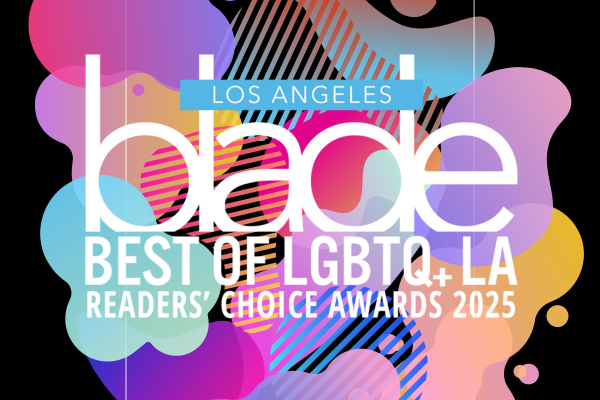
The 2025 Los Angeles Blade Best of LGBTQ LA Awards are here! You submitted your nominations—now it’s time to vote for the finalists. Voting is open through May 2, 2025.
Among some of your favorite categories are Best Drag Performer, Local Influencer of the Year, Best Happy Hour, Go-Go of the Year, Activist of the Year, Public Official of the Year, Best Musical Artist, Best Non-Profit, Best Bartender, Best DJ, Best Local Podcast, and so many more!
Winners will be revealed at the Best of LGBTQ LA celebration on Thursday, May 22 at The Abbey. Stay tuned for more party details coming soon!
Vote using the form below or by clicking HERE.
Books
‘Pronoun Trouble’ reminds us that punctuation matters
‘They’ has been a shape-shifter for more than 700 years

‘Pronoun Trouble’
By John McWhorter
c.2025, Avery
$28/240 pages
Punctuation matters.
It’s tempting to skip a period at the end of a sentence Tempting to overuse exclamation points!!! very tempting to MeSs with capital letters. Dont use apostrophes. Ask a question and ignore the proper punctuation commas or question marks because seriously who cares. So guess what? Someone does, punctuation really matters, and as you’ll see in “Pronoun Trouble” by John McWhorter, so do other parts of our language.

Conversation is an odd thing. It’s spontaneous, it ebbs and flows, and it’s often inferred. Take, for instance, if you talk about him. Chances are, everyone in the conversation knows who him is. Or he. That guy there.
That’s the handy part about pronouns. Says McWhorter, pronouns “function as shorthand” for whomever we’re discussing or referring to. They’re “part of our hardwiring,” they’re found in all languages, and they’ve been around for centuries.
And, yes, pronouns are fluid.
For example, there’s the first-person pronoun, I as in me and there we go again. The singular I solely affects what comes afterward. You say “he-she IS,” and “they-you ARE” but I am. From “Black English,” I has also morphed into the perfectly acceptable Ima, shorthand for “I am going to.” Mind blown.
If you love Shakespeare, you may’ve noticed that he uses both thou and you in his plays. The former was once left to commoners and lower classes, while the latter was for people of high status or less formal situations. From you, we get y’all, yeet, ya, you-uns, and yinz. We also get “you guys,” which may have nothing to do with guys.
We and us are warmer in tone because of the inclusion implied. She is often casually used to imply cars, boats, and – warmly or not – gay men, in certain settings. It “lacks personhood,” and to use it in reference to a human is “barbarity.”
And yes, though it can sometimes be confusing to modern speakers, the singular word “they” has been a “shape-shifter” for more than 700 years.
Your high school English teacher would be proud of you, if you pick up “Pronoun Trouble.” Sadly, though, you might need her again to make sense of big parts of this book: What you’ll find here is a delightful romp through language, but it’s also very erudite.
Author John McWhorter invites readers along to conjugate verbs, and doing so will take you back to ancient literature, on a fascinating journey that’s perfect for word nerds and anyone who loves language. You’ll likely find a bit of controversy here or there on various entries, but you’ll also find humor and pop culture, an explanation for why zie never took off, and assurance that the whole flap over strictly-gendered pronouns is nothing but overblown protestation. Readers who have opinions will like that.
Still, if you just want the pronoun you want, a little between-the-lines looking is necessary here, so beware. “Pronoun Trouble” is perfect for linguists, writers, and those who love to play with words but for most readers, it’s a different kind of book, period.
The Blade may receive commissions from qualifying purchases made via this post.
-
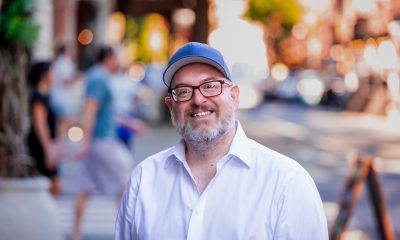
 Bars & Parties5 days ago
Bars & Parties5 days agoBear World Magazine gives the bear community a mighty roar
-
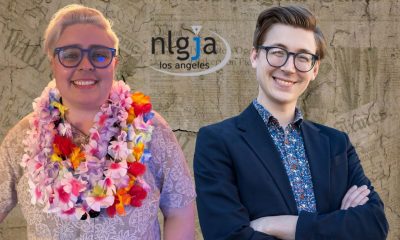
 Features5 days ago
Features5 days agoMeet the new co-presidents of the NLGJA LA Chapter
-
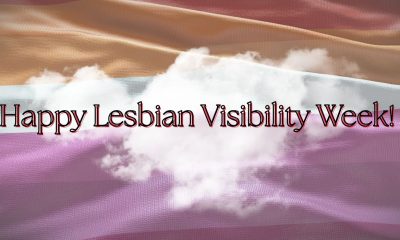
 Events5 days ago
Events5 days agoCelebrate Lesbian Visibility Week with The Curve Foundation
-
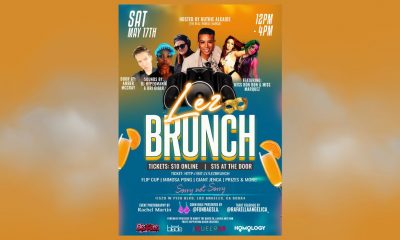
 Events3 days ago
Events3 days agoNew ‘Party with a Purpose’ lesbian brunch to be hosted at Sorry Not Sorry
-
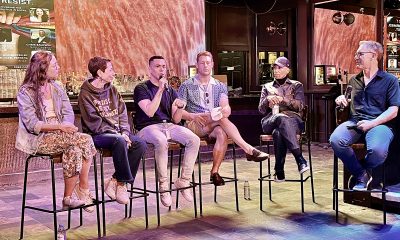
 Events4 days ago
Events4 days agoLos Angeles Blade’s Community Series kicks off with panel
-
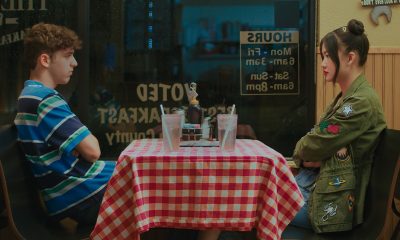
 Arts & Entertainment4 days ago
Arts & Entertainment4 days agoInfectious ‘Egghead & Twinkie’ celebrates love and allyship
-
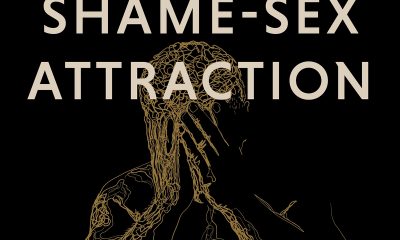
 Books2 hours ago
Books2 hours agoChronicling disastrous effects of ‘conversion therapy’

